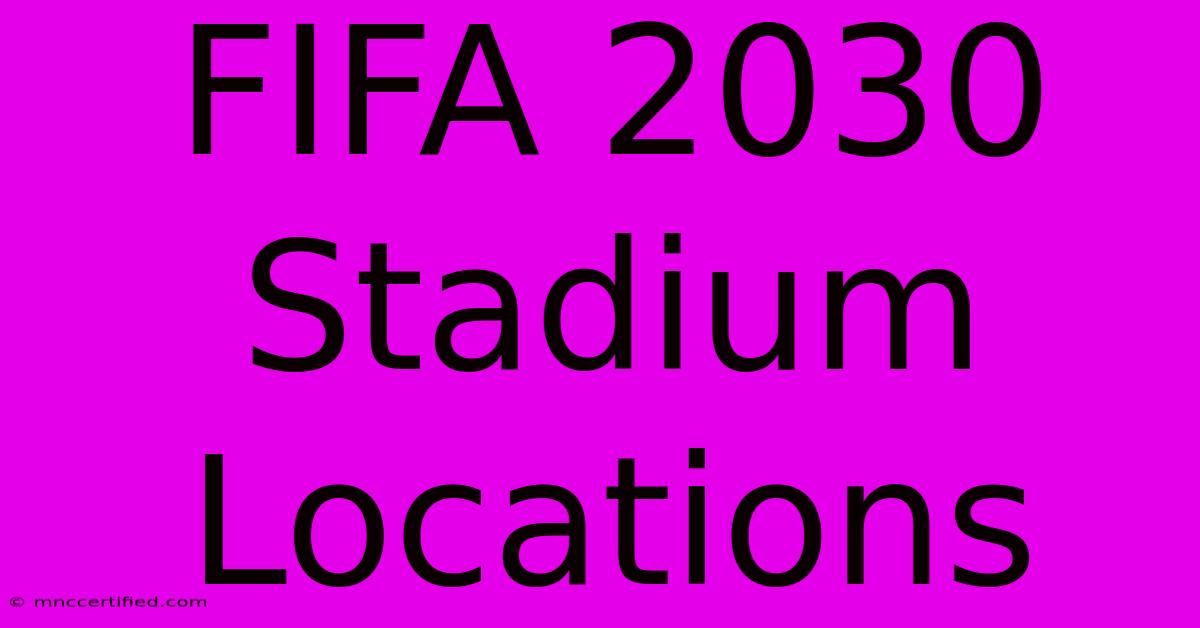FIFA 2030 Stadium Locations

Table of Contents
FIFA 2030 Stadium Locations: A Potential Look at the World Cup's Venues
The 2030 FIFA World Cup is still a few years away, but speculation about potential host nations and stadium locations is already heating up. While the official announcement of the host(s) is yet to be made, several countries have submitted bids, each boasting impressive stadium infrastructure and a passionate football fanbase. This article explores some potential stadium locations based on the current bidding process and existing infrastructure. We'll examine key factors influencing stadium selection and offer insights into what we might expect for the 2030 tournament.
Potential Host Nations and Their Stadiums
The race to host the 2030 World Cup is incredibly competitive, with several strong contenders emerging. The final decision by FIFA will hinge on a variety of factors, including stadium capacity, accessibility, infrastructure, and overall economic viability. Let's look at some potential host nations and their potential stadium contributions:
1. Joint Iberian Bid (Spain/Portugal): A Shared Legacy
A joint bid from Spain and Portugal offers a compelling proposition. Both nations possess a rich footballing history and boast several world-class stadiums already prepared for major international events. Some potential venues include:
- Estadio Wanda Metropolitano (Madrid, Spain): A modern and impressive stadium, home to Atlético Madrid, perfectly suited for World Cup matches.
- Camp Nou (Barcelona, Spain): One of the largest stadiums in Europe, this iconic venue is a strong contender for hosting opening or final matches.
- Estádio da Luz (Lisbon, Portugal): Home to Benfica, this stadium has a proven track record in hosting major international competitions.
- Estádio do Dragão (Porto, Portugal): Another top-tier Portuguese stadium that has showcased its capabilities in hosting major events. This venue could be a very viable location.
This joint bid capitalizes on existing infrastructure, minimizing the need for significant new construction, which is a significant advantage in the bidding process. Sustainability and efficient use of resources are key themes for FIFA's selection criteria.
2. Other Potential Contenders and Their Stadiums:
While the Iberian bid is prominent, other nations have also expressed interest. The specific stadium selections would depend heavily on which nation(s) secure the hosting rights. Factors like existing infrastructure, planned upgrades, and fan accessibility will play a crucial role.
-
Uruguay, Argentina, Paraguay, and Chile (Joint South American Bid): This bid leverages the passion for football across South America. Existing stadiums in major cities like Montevideo, Buenos Aires, Asunción, and Santiago could be renovated and upgraded to meet FIFA standards.
-
Morocco: A single-nation bid from Morocco would likely focus on its modern stadiums, which have already proven their ability to host high-profile matches.
-
Other Potential Bids: It's also possible other bids from different continents could emerge, adding even more uncertainty to the stadium selection process.
Key Factors Influencing Stadium Selection
FIFA's selection process is rigorous and takes numerous factors into account:
- Capacity: Stadia must meet minimum capacity requirements to accommodate large crowds.
- Accessibility: Easy access for fans, teams, and officials is paramount. Proximity to transportation hubs is a critical factor.
- Infrastructure: The surrounding infrastructure, including hotels, transportation, and communication networks, needs to be robust.
- Sustainability: FIFA prioritizes environmentally friendly stadiums and operational practices.
- Safety and Security: Stringent security measures and safety protocols must be in place.
Conclusion: Awaiting the Official Announcement
The selection of stadiums for the 2030 FIFA World Cup remains uncertain until FIFA makes its official announcement. However, by examining the potential host nations and their existing infrastructure, we can gain a glimpse into the exciting possibilities for this major sporting event. The eventual choices will reflect a careful balance between sporting spectacle, economic viability, and commitment to sustainability. Keep an eye on FIFA's updates for the most accurate and up-to-date information regarding the 2030 World Cup.

Thank you for visiting our website wich cover about FIFA 2030 Stadium Locations. We hope the information provided has been useful to you. Feel free to contact us if you have any questions or need further assistance. See you next time and dont miss to bookmark.
Featured Posts
-
Rangers V Tottenham Europa League Tv Channel
Dec 12, 2024
-
Car Crash Kills Teen Injures Three
Dec 12, 2024
-
Aardman And Pokemon Team Up
Dec 12, 2024
-
Toronto Lands Gimenez In Trade Deal
Dec 12, 2024
-
Gomez Blanco Announce Engagement
Dec 12, 2024